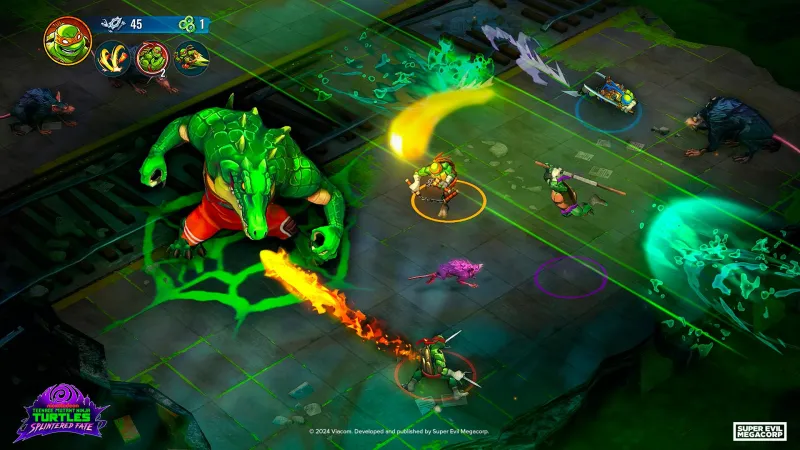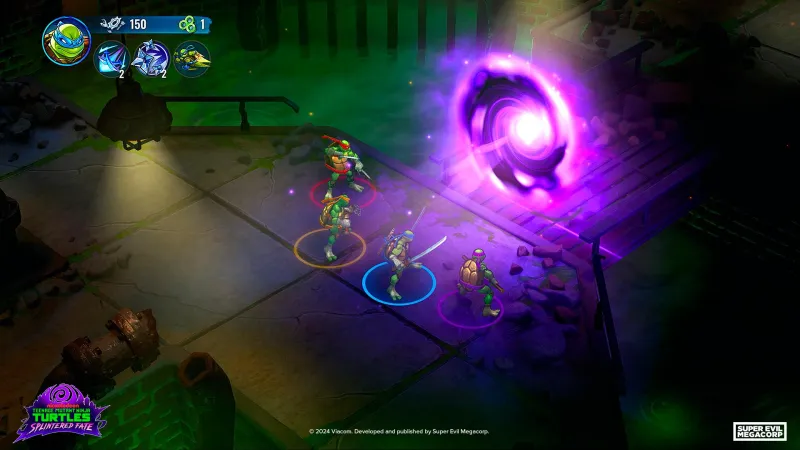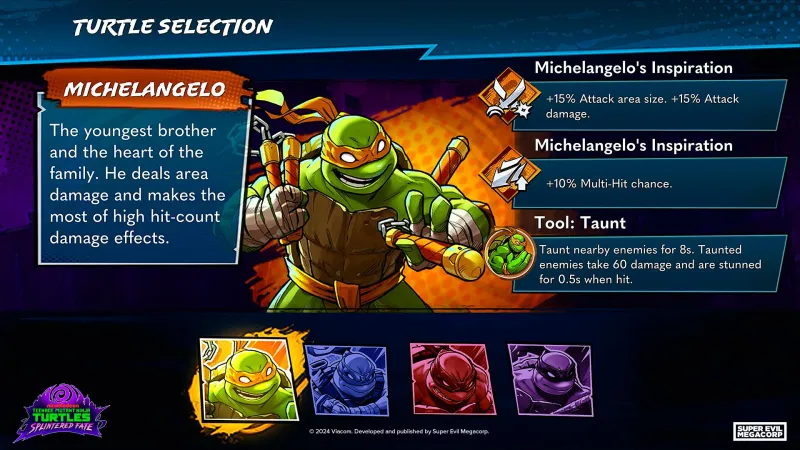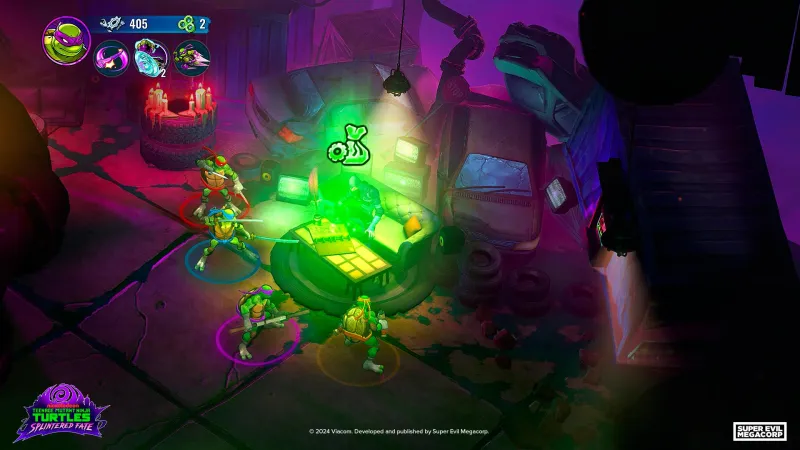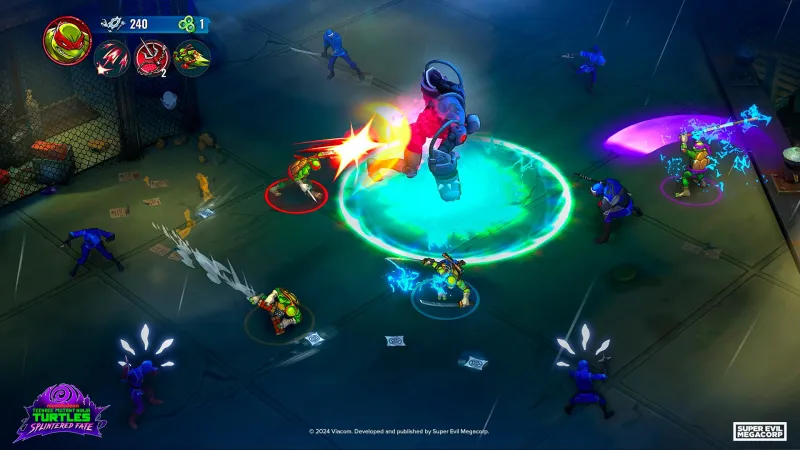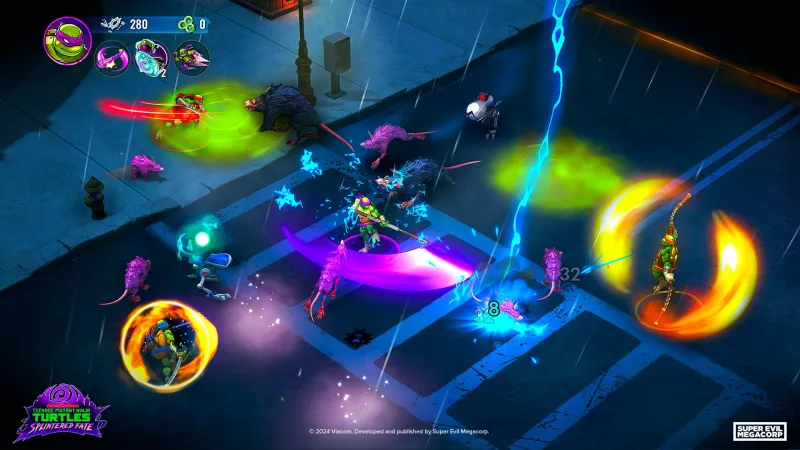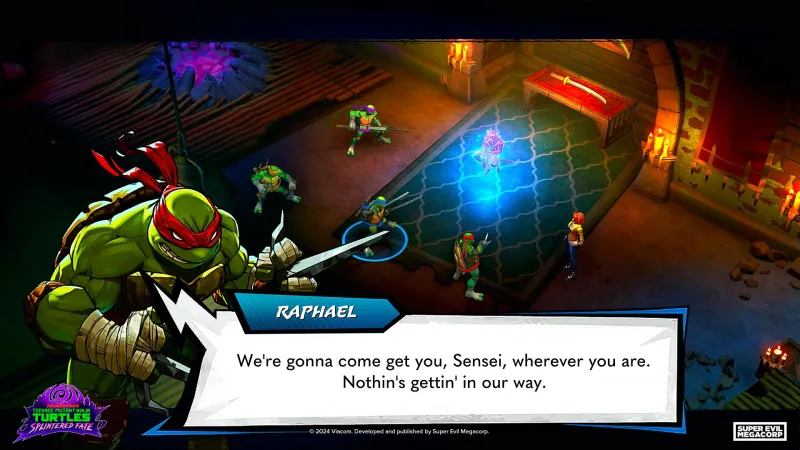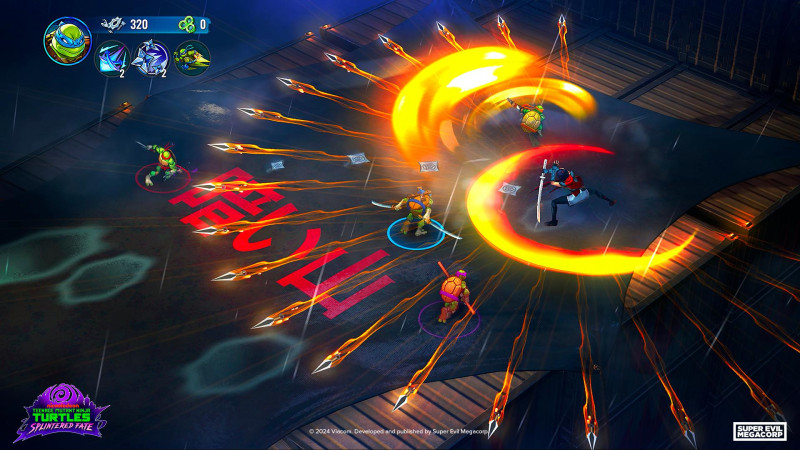
Reviewed on:
Switch
Platform:
Switch, iOS
Developer:
Super Evil Megacorp
Release:
May 4, 2023
(iOS), July 17, 2024
(Switch)
The Teenage Mutant Ninja Turtles starred in several iconic video games throughout the franchise’s 40-year history, but none are more beloved than the beat ’em up entries like the 1989 arcade game and Turtles in Time. However, that genre often lacks the depth modern gamers desire. Teenage Mutant Ninja Turtles: Splintered Fate takes various cues from recent popular games – specifically Supergiant’s smash hit, Hades – en route to modernizing the action-packed hack-and-slash gameplay the Turtles have been known for since their earliest days in the medium. The result is a fun roguelike full of meaningful progression and engaging action that doesn’t soar quite as high as the games that inspired it.
After a mysterious captor abducts Master Splinter, you control one of the four iconic turtle brothers on a quest to get him back. Each playable character possesses different basic combos, special attacks, and tools, allowing you to pick a foundation to build upon as you progress through each run. Leonardo’s average range is complemented nicely by his ability to toss shurikens and gain an extra charge on his special, while Donatello’s long range is offset by being a tad stiffer, but his tool also recharges 80 percent faster (after all, he does do machines). I loved Michelangelo’s sweeping nunchucks and the chance to land multiple hits on a single strike, but Raphael’s grappling hook that pulls enemies closer and higher critical damage quickly made him my main. You’ll have plenty of time to experiment to find your right fit, as each time you die, you start back in the Turtles’ lair to start the run anew.
Each run plays out in similar fashion: You start by choosing a skill like additional dash charges, a better chance to dodge, or an enhancement to your selected turtle’s special ability. You then fight through room after room of enemies ranging from rats and Mousers to Foot Clan ninjas and fellow mutants. Each faction brings different attacks, requiring slightly different approaches, but the action typically consists of dashing around the arena to avoid incoming attacks while working towards clearing the room. Combat feels great, with each attack in your arsenal feeling like an impactful part of a successful and fun strategy. This is particularly true when Elite enemies drop in, like a giant StockGen robot or special elemental Foot assassins.
Rooms typically don’t take long to clear. When the repetition begins to set in from successive runs, I often find enjoyment in trying out new combos or simply getting through the earliest rooms as quickly as possible. Testing out new builds or setting your own challenges are fun, but it doesn’t change that you’re still completing the same rooms and facing the same bosses on repeat. Splintered Fate attempts to remedy this by introducing new variants of the handful of bosses in the game, but regardless of whether the first boss suddenly summons more minions or the second boss now uses flame attacks, I still dreaded facing them for the 20th time. Even the gauntlet challenges, unlocked after completing your first run, do little to diversify the experience. Splintered Fate’s co-op, which can be played locally or online, shakes things up by letting you combine the Turtles’ tools and abilities, but the structure remains the same.
Obviously, a crucial element of the roguelike formula is the upward trajectory of both your skills as a player and your character’s strengths through permanent upgrades. TMNT: Splintered Fate handles this admirably; I always felt I was improving run over run, aided by the permanent upgrades unlocked through various currencies. This satisfying loop is, unfortunately, hindered by the sheer number of currencies you need to keep track of.
In addition to Scrap, the in-run currency used for temporary upgrades, you receive two distinct permanent currencies to upgrade different parts of the experience; one lets you upgrade the economy, including the amount of Scrap dropped by enemies and more powerful upgrades offered after beating rooms, while the other permanently improves your character’s attributes like attack damage and health. However, some upgrades also require special items dropped by bosses, of which there are several, in conjunction with the permanent currencies. If it sounds confusing, that’s because it is. I don’t mind having more stringent requirements to unlock higher-level upgrades, but when a game requires me to constantly reference a help screen to know what each of its more-than-nine currencies does and how to obtain them, it should serve as a warning to the developers that the system has gone too far.
Despite the overt repetition, both by design and through over-design, Teenage Mutant Ninja Turtles: Splintered Fate effectively channels the spirit of the most well-liked games that have come before it in the franchise. Though I sometimes succumbed to frustration after falling short during a promising run, the experience only galvanized me to excitedly take what I learned from my failures into the next run.
Score:
7.75
About Game Informer’s review system
Source: Game Informer Teenage Mutant Ninja Turtles: Splintered Fate Review – Radical Repetition



